复习七年级下Unit2的重点知识和语法点
七下第二单元语法要点英语
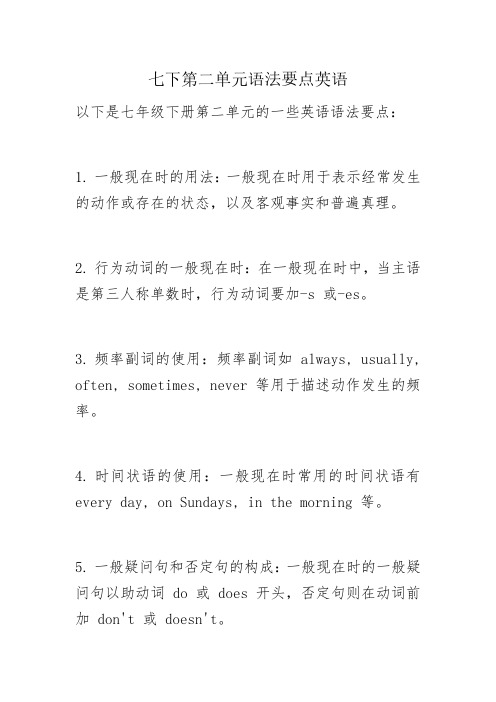
七下第二单元语法要点英语
以下是七年级下册第二单元的一些英语语法要点:
1.一般现在时的用法:一般现在时用于表示经常发生的动作或存在的状态,以及客观事实和普遍真理。
2.行为动词的一般现在时:在一般现在时中,当主语是第三人称单数时,行为动词要加-s或-es。
3.频率副词的使用:频率副词如always,usually, often,sometimes,never等用于描述动作发生的频率。
4.时间状语的使用:一般现在时常用的时间状语有every day,on Sundays,in the morning等。
5.一般疑问句和否定句的构成:一般现在时的一般疑问句以助动词do或does开头,否定句则在动词前加don't或doesn't。
6.介词的用法:介词用于表示时间、地点、方位等。
7.名词所有格的构成:名词所有格用于表示所属关系,通常在名词后加's。
8.形容词性物主代词的用法:形容词性物主代词用于修饰名词,起到限定作用。
这些是七年级下册第二单元的一些语法要点,希望对你有所帮助!。
人教版七年级英语下册Unit 2知识点汇总
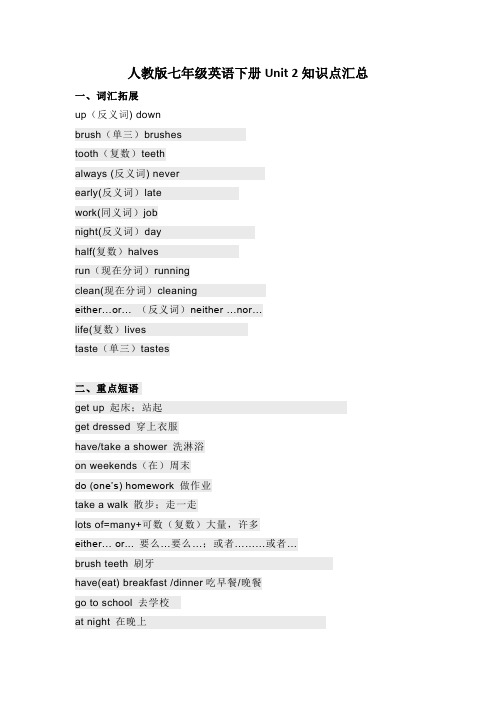
人教版七年级英语下册Unit 2知识点汇总一、词汇拓展up(反义词) downbrush(单三)brushestooth(复数)teethalways (反义词) neverearly(反义词)latework(同义词)jobnight(反义词)dayhalf(复数)halvesrun(现在分词)runningclean(现在分词)cleaningeither…or… (反义词)neither …nor…life(复数)livestaste(单三)tastes二、重点短语get up 起床;站起get dressed 穿上衣服have/take a shower 洗淋浴on weekends(在)周末do (one’s) homework 做作业take a walk 散步;走一走lots of=many+可数(复数)大量,许多either… or... 要么…要么…;或者………或者…brush teeth 刷牙have(eat) breakfast /dinner吃早餐/晚餐go to school 去学校at night 在晚上from…to… 从……到……in the morning/ afternoon /evening 在上午/下午/晚上go to work 去上班That's a funny time for… 那是做……有意思的时间。
be late for………迟到on school days 在上学期间a quarter past /to+钟点数……过/差一刻钟go to bed 上床睡觉half past +钟点数……点半go home回家eat quickly 吃得快play sports 做运动have much time for …有许多时间做……for half an hour 半小时get home 到家eat a good breakfast 早餐吃得好,好好吃一顿早餐eat … for lunch午餐吃……after lunch /dinner 午餐/晚餐后be (not) good for 对……健康有(没)益taste good 尝起来好吃have a very healthy life 有健康的生活need to do … 需要做……from Monday to Friday从周一到周五radio station 广播电台make breakfast for sb. 替某人做早饭get to school 到校三、经典句型1.---What time do you usually get up,Rick?里克,你通常几点起床?---I usually get up at six thirty.我通常六点半起床2.---When does Scott go to work?斯科特什么时候去上班?---He always goes to work at eleven o'clock.他总是在十一点去上班。
人教七年级下unit2语法
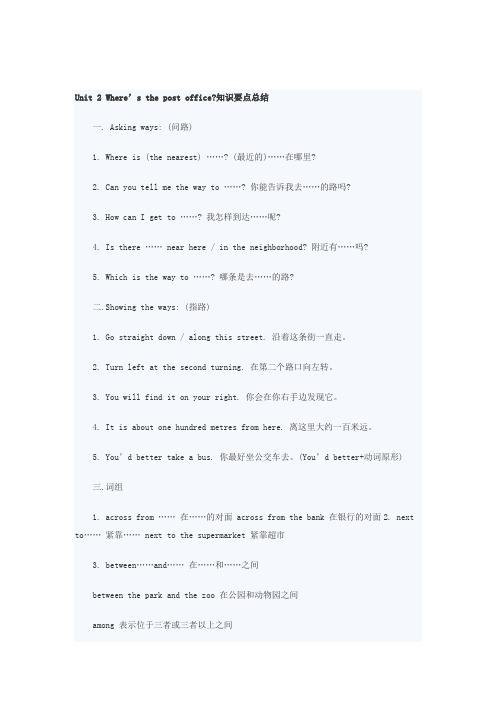
Unit 2 Where’s the post office?知识要点总结一. Asking ways: (问路)1. Where is (the nearest) ……? (最近的)……在哪里?2. Can you tell me the way to ……? 你能告诉我去……的路吗?3. How can I get to ……? 我怎样到达……呢?4. Is there …… near here / in the neighborhood? 附近有……吗?5. Which is the way to ……? 哪条是去……的路?二.Showing the ways: (指路)1. Go straight down / along this street. 沿着这条街一直走。
2. Turn left at the second turning. 在第二个路口向左转。
3. You will find it on your right. 你会在你右手边发现它。
4. It is about one hundred metres from here. 离这里大约一百米远。
5. You’d better take a bus. 你最好坐公交车去。
(You’d better+动词原形)三.词组1. across from ……在……的对面 across from the bank 在银行的对面2. next to……紧靠…… next to the supermarket 紧靠超市3. between……and……在……和……之间between the park and the zoo 在公园和动物园之间among 表示位于三者或三者以上之间4. in front of……在……前面 There is a tree in front of the classroom.课室前面有棵树。
in the front of……在……(内)的前部 There is a desk in the front of the classroom.课室内的前部有张桌子。
七下英语第二单元笔记
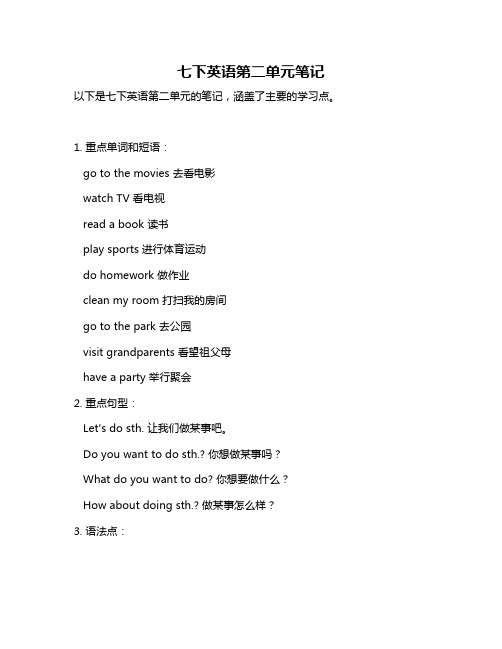
七下英语第二单元笔记以下是七下英语第二单元的笔记,涵盖了主要的学习点。
1. 重点单词和短语:go to the movies 去看电影watch TV 看电视read a book 读书play sports 进行体育运动do homework 做作业clean my room 打扫我的房间go to the park 去公园visit grandparents 看望祖父母have a party 举行聚会2. 重点句型:Let's do sth. 让我们做某事吧。
Do you want to do sth.? 你想做某事吗?What do you want to do? 你想要做什么?How about doing sth.? 做某事怎么样?3. 语法点:现在进行时态(Present Continuous Tense):表示正在进行的动作或正在发生的事情。
结构为“be动词(am/is/are)+动词的现在分词(ing形式)”。
例如:I am watching TV.(我正在看电视。
)动词的ing形式的构成:大多数动词在词尾加“-ing”,如“watching”;以不发音的字母e结尾的动词,先去掉e再加“-ing”,如“reading”;以重读闭音节结尾的动词,如果末尾只有一个辅音字母,应先双写这个字母再加“-ing”,如“running”。
4. 学习建议:结合教材中的对话和活动,多练习使用重点单词和短语,提高口语表达能力。
注意现在进行时态的用法,掌握其基本结构和变体形式,以便在实际语境中运用自如。
除了教材中的例句,可以自己尝试造句,锻炼语言组织能力。
结合个人生活实际,思考自己经常做的事情,用英语表达出来,提高实际应用能力。
人教版初一七年级英语(下)第二单元Unit2知识点+语法整合
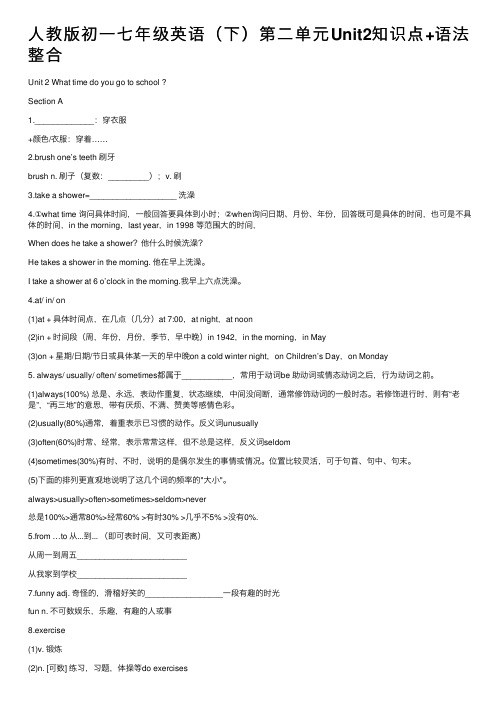
⼈教版初⼀七年级英语(下)第⼆单元Unit2知识点+语法整合Unit 2 What time do you go to school ?Section A1._____________:穿⾐服+颜⾊/⾐服:穿着……2.brush one’s teeth 刷⽛brush n. 刷⼦(复数:_________);v. 刷3.take a shower=___________________ 洗澡4.①what time 询问具体时间,⼀般回答要具体到⼩时;②when询问⽇期、⽉份、年份,回答既可是具体的时间,也可是不具体的时间,in the morning,last year,in 1998 等范围⼤的时间,When does he take a shower?他什么时候洗澡?He takes a shower in the morning. 他在早上洗澡。
I take a shower at 6 o’clock in the morning.我早上六点洗澡。
4.at/ in/ on(1)at + 具体时间点,在⼏点(⼏分)at 7:00,at night,at noon(2)in + 时间段(周,年份,⽉份,季节,早中晚)in 1942,in the morning,in May(3)on + 星期/⽇期/节⽇或具体某⼀天的早中晚on a cold winter night,on Children’s Day,on Monday5. always/ usually/ often/ sometimes都属于___________,常⽤于动词be 助动词或情态动词之后,⾏为动词之前。
(1)always(100%) 总是、永远,表动作重复,状态继续,中间没间断,通常修饰动词的⼀般时态。
若修饰进⾏时,则有“⽼是”,“再三地”的意思,带有厌烦、不满、赞美等感情⾊彩。
(2)usually(80%)通常,着重表⽰已习惯的动作。
Unit2知识点讲解人教版英语七年级下册

1.英语钟点时刻的表达在英语中,钟点时刻的表达除了用阿拉伯数字(如8:10,12:45)外,还可以用以下几种表达方式。
◆当时间是整点时,可用“钟点数+o'clock”来表达,其中o'clock可以省略。
如:6:00 → six (o'clock) 11:00 → eleven (o'clock)◆当时间不是整点时,表达方式有以下两种:1. 钟点数+分钟数。
如:9:08 → nine eight 14:40 → fourteen forty2. 分钟数+ past / to +钟点数1) 当分钟数小于30时,用“分钟数+ past +钟点数”表示“几点过几分”。
如:8:09 → nine past eight7:25 → twentyfive past seven2) 当分钟数大于30时,用“(60-分钟数) + to +下一个钟点数”表示“差几分到几点”。
如:11:40 → twenty to twelve 2:58 → two to three注意:在分钟数中,15分钟还可以用a quarter表示,30分钟还可以用half来表示。
如:11:15 → a quarter past eleven8:45 → a quarter to nine13:30 → half past thirteen◆ A.M.(a.m.)和P.M.(p.m.)在12小时制中,我们可以用A.M.(a.m.)和P.M.(p.m.)来区分上、下半天。
A.M.(a.m.)意为“午前、上午”; P.M.(p.m.)意为“午后、下午”。
如:早上六点半→ 6:30 a.m. / half past six in the morning中午十二点→ 12:00 p.m. / 12 o'clock in the daytime午夜十二点→ 12:00 a.m. / 12 o'clock at night / at midnight【运用】用两种方式写出下列时间的英语表达1. 2. 3.___________________ 或___________________ ___________________或______________________________________或___________________参考答案1. four thirty; half past four2. eleven five; five past eleven3. nine fifteen; a quarter past nine2. what time & when 引导的特殊疑问句what time和when均可对时间状语进行提问,用来询问什么时间。
人教版英语七年级下册Unit2【重点短语+词法语法句法精讲】
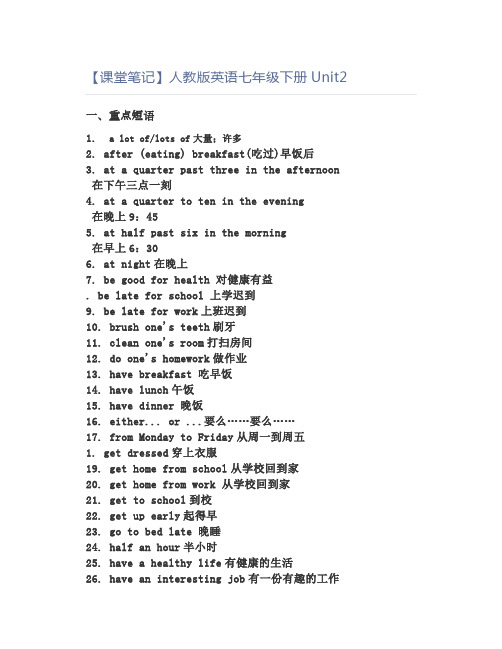
【课堂笔记】人教版英语七年级下册Unit2一、重点短语1. a lot of/lots of大量;许多2. after (eating) breakfast(吃过)早饭后3. at a quarter past three in the afternoon 在下午三点一刻4. at a quarter to ten in the evening在晚上9:455. at half past six in the morning在早上6:306. at night在晚上7. be good for health 对健康有益. be late for school 上学迟到9. be late for work上班迟到10. brush one's teeth刷牙11. clean one's room打扫房间12. do one's homework做作业13. have breakfast 吃早饭14. have lunch午饭15. have dinner 晚饭16. either... or ...要么……要么……17. from Monday to Friday从周一到周五1. get dressed穿上衣服19. get home from school从学校回到家20. get home from work 从学校回到家21. get to school到校22. get up early起得早23. go to bed late 晚睡24. half an hour半小时25. have a healthy life有健康的生活26. have an interesting job有一份有趣的工作27. take a walk散步2. on school nights在上学的晚上29. take a shower洗淋浴30. work at a radio station在电台工二、重点句型1.—What time/When do you usually exercise?你通常什么时候锻炼?—I usually exercise at five o'clock.我通常在5点锻炼。
人教七年级下册英语unit2知识点总结
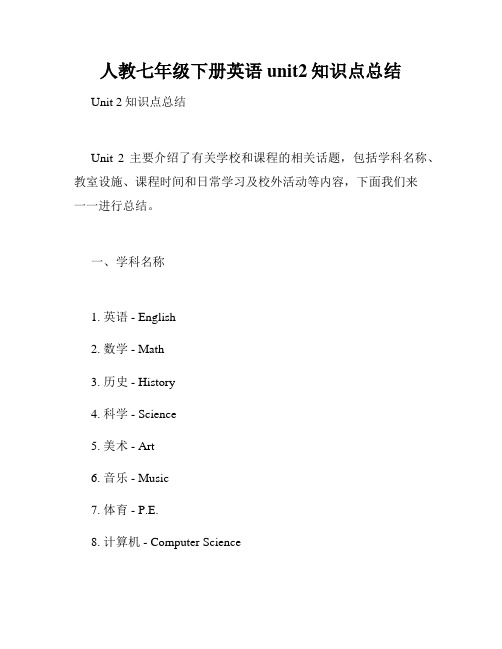
人教七年级下册英语unit2知识点总结Unit 2知识点总结Unit 2主要介绍了有关学校和课程的相关话题,包括学科名称、教室设施、课程时间和日常学习及校外活动等内容,下面我们来一一进行总结。
一、学科名称1. 英语 - English2. 数学 - Math3. 历史 - History4. 科学 - Science5. 美术 - Art6. 音乐 - Music7. 体育 - P.E.8. 计算机 - Computer Science二、教室设施1. 黑板 - blackboard2. 白板 - whiteboard3. 投影仪 - projector4. 音响 - sound system5. 地图 - map6. 水龙头 - tap7. 电视 - TV8. 电脑 - computer9. 灯 - light10. 窗户 - window三、课程时间1. 上午 - in the morning2. 下午 - in the afternoon3. 晚上 - in the evening4. 早上 - in the early morning5. 夜晚 - at night6. 每周 - every week7. 每天 - every day8. 周末 - on weekends四、日常学习1. 做作业 - do homework2. 练习 - practice3. 复习 - review4. 读书 - read books5. 写作 - write compositions6. 讨论 - have discussions7. 板书笔记 - take notes8. 教师讲解 - teacher's explanation9. 学习笔记 - study notes10. 做练习 - do exercises五、校外活动1. 课外活动 - extracurricular activities2. 运动会 - sports meeting3. 聚会 - party4. 社交活动 - social activities5. 英语角 - English corner6. 爱好小组 - hobby group7. 社团活动 - club activities8. 学校之旅 - school trip以上就是Unit 2的主要内容,希望能够帮助大家更好地学习英语,更好地了解学校和课程的相关话题。
人教版七年级英语下 Unit2 知识点语法归纳总结
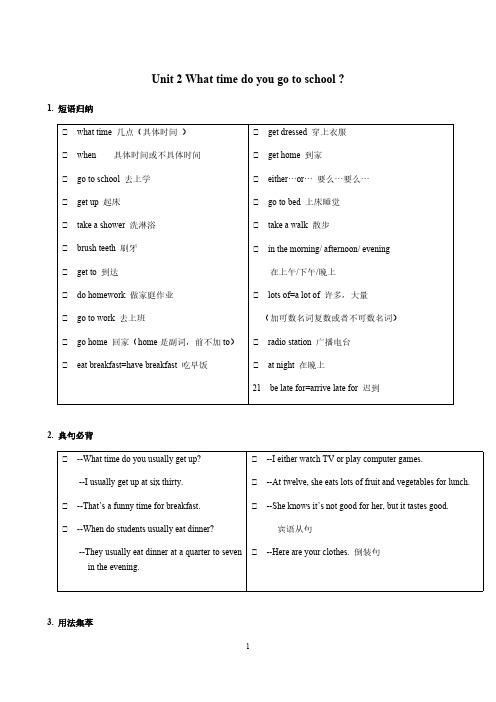
Unit 2 What time do you go to school ?1.短语归纳①what time 几点(具体时间)①when具体时间或不具体时间①go to school 去上学①get up 起床①take a shower 洗淋浴①brush teeth 刷牙①get to 到达①do homework 做家庭作业①go to work 去上班①go home 回家(home是副词,前不加to)①eat breakfast=have breakfast 吃早饭①get dressed 穿上衣服①get home 到家①either…or…要么…要么…①go to bed 上床睡觉①take a walk 散步①in the morning/ afternoon/ evening在上午/下午/晚上①lots of=a lot of 许多,大量(加可数名词复数或者不可数名词)①radio station 广播电台①at night 在晚上21 be late for=arrive late for 迟到2.典句必背①--What time do you usually get up?--I usually get up at six thirty.①--That’s a funny time for breakfast.①--When do students usually eat dinner?--They usually eat dinner at a quarter to sevenin the evening. ①--I either watch TV or play computer games.①--At twelve, she eats lots of fruit and vegetables for lunch.①--She knows it’s not good for her, but it tastes good.宾语从句①--Here are your clothes. 倒装句3.用法集萃(1)What time do you usually get up , Rick?①频度副词:表示动作频率的副词辨析:always, usually, often, sometimes, seldom, never频度频度副词含义举例always一直;总是The sun always rises in the east and sets in the west.太阳总是东升西落usually通常I usually ask my father for help. 我通常会向我爸爸求助often经常It often rains here in April. 这儿四月份常下雨sometimes有时;不时I sometimes wait for him at the school gate.我有时在学校大门口等他seldom/hardly/hardly/ever很少;几乎不I don’t like swimming, so I seldom go swimming.我不喜欢游泳,所以我很少去游泳频率由高到低never从不;从来没有I never tell lies. 我从不说谎①常见的get 短语get up 起床;站起get back 回来get on 上车get out 出去get off 下车get to 到达get dressed 穿上衣服get married 结婚get together 相聚;聚会get ready (for) (为...)做好准备(2)辨析 get dressed 与 be dressed in①get dressed 表示“穿”的动作①be dressed in 表示“穿”的状态①拓展:dress, put on, wear, be indress其后可跟表示人的名词或代词,意为“给...穿衣服”She can dress herself.她会自己穿衣服put on意为“穿上;戴上”,强调“穿、戴”的动作You’d better put on your coat.你最好穿上你的外套wear意为“穿着;戴着”,强调“穿、戴”的状态She is wearing a beautiful evening dress.她穿着一件漂亮的晚礼服be in其后可跟衣服或颜色类的词汇,也表示“穿、戴”的状态The girl in red is my sister.那个穿红色衣服的是我的妹妹(3)辨析:at, in,on→I usually get up at six thirty.at at和时间点搭配,还可以和noon,night等搭配at nine o’clock/at nightin in和年、月、季节搭配,还可以和morning,evening等搭配in July/in summer/in the morning on on和星期、日期搭配,还可以表示在具体某一天的上午、下午或晚上on Sunday/on June 1st(4)exercise的用法→ After that, I usually exercise at about ten twenty.那之后我通常在10点20分左右锻炼身体①作动词,意为“锻炼”,可作及物动词,也可作不及物动词例:How often do you exercise? 你多久锻炼一次?He exercises his body every day. 他每天锻炼身体。
人教英语七年级下册+Unit+2+词汇词组语法重点复习(共15张PPT)
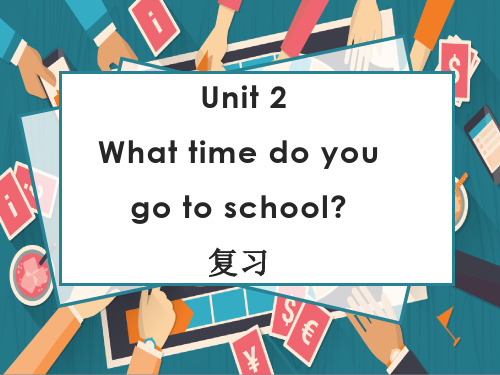
Unit 2 What time do you go to school?
6. What time do you usually get up? 1)这是一个用来询问什么时间做某事的常用句型 句式: What+time+do/does+主语+谓语动词原形+其他?
What time does Lisa go to bed? What time do you usually have lunch? 2)短语what time的意思是“几点”,它和when是同义词,都是对时间进行提问, 但what time所问的时间范围比较小,一般用来提问比较精确的时间,回答的时候 一般具体到几点。而when所问的时间范围比what time要大,回答的时候可以用几 点钟,也可以是上午或者下午,甚至是哪一天、哪一年。 -When is your birthday? -It’s May 10.
Mary, can you help your baby sister get dressed? After I get dressed, I have breakfast.
Unit 2 What time do you go to school?
3. take a shower 1)shower 名词,意为“阵雨,淋浴”;take a shower 意为“洗澡,洗淋浴”, 等于have a shower。shower前面可以加形容词来修饰。
Practice
Ⅳ.句型转换。
1. He gets home at five in the afternoon.(就划线部分提问) _______ _______ _______ he ______ home in the afternoon?
2. Now it’s five thirty.(同义句) Now it’s _______ _______ ________.
北师大版七年级下册英语unit2知识点语法点(含答案)
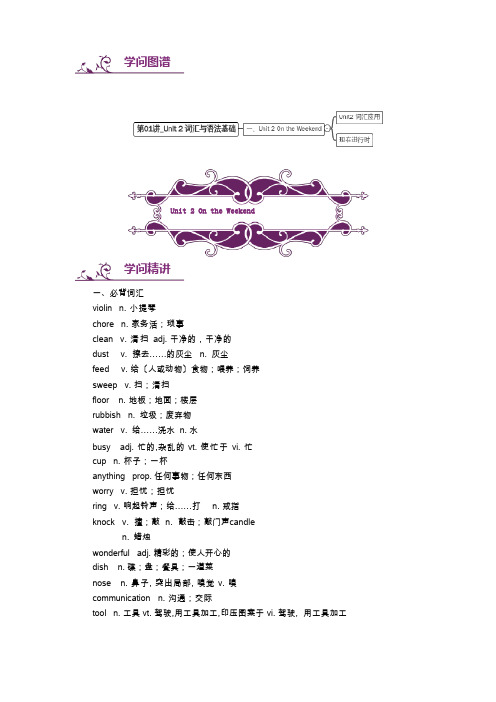
学问图谱Unit 2 On the Weekend学问精讲一、必背词汇violin n. 小提琴chore n. 家务活;琐事clean v. 清扫adj. 干净的,干净的dust v. 擦去……的灰尘n. 灰尘feed v. 给〔人或动物〕食物;喂养;饲养sweep v. 扫;清扫floor n. 地板;地面;楼层rubbish n. 垃圾;废弃物water v. 给……浇水n. 水busy adj. 忙的,杂乱的 vt. 使忙于 vi. 忙cup n. 杯子;一杯anything prop. 任何事物;任何东西worry v. 担忧;担忧ring v. 响起铃声;给……打n. 戒指knock v. 撞;敲n. 敲击;敲门声candlen. 蜡烛wonderful adj. 精彩的;使人开心的dish n. 碟;盘;餐具;一道菜nose n. 鼻子, 突出局部, 嗅觉 v. 嗅communication n. 沟通;交际tool n. 工具 vt. 驾驶,用工具加工,印压图案于 vi. 驾驶, 用工具加工instant adj. 马上的message n. 信息,消息text n. 文本;文章 v. 发短信send v. 发送receive v. 接到;收到while n. 一会儿 conj. 在……期间slow adj. 慢的 adv. 渐渐地 vt.& vi. 放慢,减速just adv. 只是;正好;刚刚website n. 网站bankn. 银行;河岸museum n. 博物馆police n. 警察部门;警方station n. 站,所,局;火车站;电视台post n. 邮政;职位 v. 邮寄;张贴;公布office n. 办公室,职务,事务train n. 火车underground n. 地铁way n. 路线;路;方法excuse v. 原谅n. 借口;理由cross v. 穿越,越过,横过street n. 大街;街道road n. 路,道路,大路corner n. 角;街角miss v. 错过;惦念opposite prep. 与……相对 adj. 对面的;across prep. 从一边到另一边;横过square n. 广场gym n. 体育馆;健身房二、重点词汇1.busy adjective /ˈbɪzi/If you are busy, you are working hard, or giving your attention to a particular thing.劳碌的;忙于……的;专注的1).Mum was busy in the kitchen.妈妈在厨房里忙活呢。
初一下册英语第二单元知识点总结归纳

初一下册英语第二单元知识点总结归纳摘要:一、重点句型及回答1.询问喜好和习惯的句型:What do you like to do? / What habits do you have?2.描述他人喜好的句型:He/She likes to do sth./ He/She has the habit of doing sth.3.表达喜好的回答:I like / I don"t like4.表达习惯的回答:I have the habit of doing sth.二、疑问词和回答1.询问时间:What time do you ...?回答:I usually ...at .../ I often ...at ...2.询问地点:Where do you ...?回答:I ...at .../ I ...in ...三、日常用语和场景1.早上问候:Good morning!2.介绍:Hello, this is .../ Nice to meet you.3.感谢:Thank you / You"re welcome4.告别:Goodbye / See you later四、重点词汇1.学科:math / science / English / physical education2.日常活动:play sports / listen to music / read books / watch TV3.食物和饮料:hamburgers / hot dogs / pizza / juice / coffee正文:初一下册英语第二单元主要涵盖了日常交际用语、疑问词询问、表达喜好和习惯的句型以及日常场景对话等内容。
以下是对这些知识点的详细总结:一、重点句型及回答1.询问喜好和习惯的句型:What do you like to do? / What habits do you have?回答:I like playing sports./ I have the habit of reading books.2.描述他人喜好的句型:He/She likes to do sth./ He/She has the habit of doing sth.例如:My brother likes playing video games./ My sister has the habit of waking up early.3.表达喜好的回答:I like / I don"t like例如:I like pizza./ I don"t like coffee.4.表达习惯的回答:I have the habit of doing sth.例如:I have the habit of exercising every day.二、疑问词和回答1.询问时间:What time do you start school?回答:I start school at 7:30./ I usually start school at 7:30.2.询问地点:Where do you live?回答:I live in a apartment./ I live near the supermarket.三、日常用语和场景1.早上问候:Good morning, classmates!2.介绍:Hello, this is my new friend, Lisa./ Nice to meet you, Lisa.3.感谢:Thank you for helping me./ You"re welcome.4.告别:Goodbye, see you later! / See you tomorrow, classmates!四、重点词汇1.学科:math / science / English / physical education例如:My favorite subject is math./ She is good at English.2.日常活动:play sports / listen to music / read books / watch TV例如:I play soccer after school./ She likes to listen to music in her free time.3.食物和饮料:hamburgers / hot dogs / pizza / juice / coffee例如:My favorite food is pizza./ I drink coffee in the morning.通过学习初一下册英语第二单元的知识点,我们可以在日常生活中更好地与他人进行交流,了解彼此的喜好和习惯。
鲁教版(五四学制)七年级下册英语Unit 2 语法知识清单

鲁教版(五四学制)七年级下册英语Unit 2 语法知识清单Unit 2 I’m going to study computer science. 知识清单一、单词Section A:1.cook(v.烹饪;煮n.厨师)→cooking (n.)烹饪→cook(n.)厨师→cooker(n.)炊具;2.violinist(n.小提琴手)→.violin(n.)小提琴3.driver(n.驾驶员)→drive(v.)开车4.pianist(n.钢琴家)→piano(n.)钢琴5.Scientist(n.科学家)→science (n.) 科学6.medicine(n.)→medical(adj.)医疗的;医学的cation(n. 教育)→educational (adj.)有教育意义的8.foreign(adj.)→foreigner(n.)外国人Section B:9.meaning(n.意义:意思)→(v.)意思是;10.beginning(n.)at the beginning of→begin (v.)开始→beginner (n.)初学者11.improve(v.)→improvement (n.)提高12.agree(v.)→agreement(n.)同意→disagree(反义词)不同意agree to do sth/ agree with sb. / agree on sth13.own(adj./pron.)→own(v.)拥有→owner(n.)主人;所有者on one's own=by oneself单独,独自某人自己的one's own14.personal(adj.个人的;私人的)→person (n.人)二、重要短语和知识点Section A:1.电脑科学computer science2.电脑程序员computer programmer 公交车司机bus driver 篮球运动员basketball player3.长大grow up4.想成为want to be 想干某事want to do=would like to do =feel like doing5.上表演课take acting lessons 上声乐课take singing lessons 上游泳课take swimming lessons 拍照take photos6.练习打篮球practice playing basketball练习做某事practice doing sth.(enjoy/finish/spend/keep/stand/mind +doing)7.擅长做某事be good at +n./doing 对...有益be good for...和某人相处得好be good with sb.8.继续/坚持做某事keep on doing sth. 保持健康keep healthy9.想让我当医生want me to be a doctor (want sb. to do sth.想让某人做某事)10.对于...不确定be not sure about...11.everyone 看成单三人称,在一般现在时中其做主语时谓语动词用单三12.确保make sure13.竭尽全力try/do one’s best 竭尽全力去做某事try one’s best to do sth.14.搬去上海move to Shanghai.15.高中大学毕业finish high school and college. 完成某事finish doing sth.16.烹饪学校a cooking school17.在大学学医study medicine at a university。
新牛津深圳版英语七年级下册第2单元知识要点

新牛津深圳版英语七年级下册第2单元知识要点Unit 2: At School本单元以“At School”为主题,主要介绍了在学校的常见场景和相关词汇、句型以及日常对话。
1. Vocabulary(词汇)本单元的词汇主要涵盖以下方面:- Places at school: classroom(教室)、library(图书馆)、computer room(计算机室)、science lab(实验室)等;- Subjects: math(数学)、English(英语)、Chinese(汉语)、science(科学)等;- School facilities: whiteboard(白板)、computer(计算机)、projector(投影仪)等;- School activities: sing a song(唱歌)、play basketball(打篮球)、do experiments(做实验)等。
2. Sentence Patterns(句型)在本单元中,我们学习了一些常用的句型,用于描述在学校的活动和交流。
- What's your favorite subject?(你最喜欢的科目是什么?)- My favorite subject is...(我的最喜欢的科目是...)- What do you do at school?(你在学校做什么?)- I study English, math, and science.(我学英语、数学和科学。
)- Let's go to the computer room.(让我们去计算机室。
)- What are you doing?(你在做什么?)- I'm playing basketball.(我在打篮球。
)3. Dialogues(对话)本单元的对话主要涵盖了在学校的常见日常交流情景。
Dialogue 1: Talking about favorite subjectsA: What's your favorite subject?B: My favorite subject is English. What about you?A: I like math the most.B: That's interesting.Dialogue 2: Making plansA: What do you do at school?B: I study different subjects. How about you?A: I study English, math, and science. Let's go to the library after class. B: Sure, that sounds like a good idea.4. Culture Corner(文化角落)本单元的文化角落部分主要介绍了英语国家和中国学校文化的一些差异。
人教版七年级下册英语Unit2知识点归纳总结和练习(含答案)

Unit2 What time do you go to school?一、词汇集锦get up_______ dress________ get dressed_______ brush________ tooth (pl. teeth)________ shower ______ take a shower_______ usually _______ forty________ never ________ early_______ fifty ________job______ work _______ station_________ radio station__________ o'clock______ night ________ funny________ exercise__________on weekends_________ best _________ group ________ half___________ past _________ quarter __________ homework_______ do (one's) homework _________ run_________ clean__________ walk _________ take a walk________quickly ________ either _________ either…or… _________ lots of ___________ sometimes __________ taste __________ life ________二、短语归纳1. go to school 去上学2. get up 起床3. get dressed 穿衣服4. brush teeth 刷牙5. eat breakfast 吃早饭6. take a shower 洗澡7. what time 什么时间8. at six forty 在六点四十9. an interesting job 一个有趣的工作10. at the radio station 在广播电视台11. usually /always/ often/ sometimes/ never 经常/总是/经常/有时/从不12. your radio show 你的广播节目13. from …..to 从….到…..14. at night 在夜晚15. a funny time 一个有趣的时间16. take exercise 锻炼17. be late for….. 因…迟到18. at about ten twenty 在大约十点二十19. on weekends 在周末20. on school days 在上学日21. half past six 六点半22. a quarter past three 三点过一刻(3:15)23. a quarter to ten 十点差一刻(9:45)24. do (one’s)homework 做(某人的)家庭作业25. take a walk 散步26. go to bed 睡觉27. eat quickly 吃得快28. have much time 有许多时间29. half an hour 半个小时30. get home 到达家31. either…..or 或者…….或者......32. eat a good breakfast 好好吃顿早餐33. lots of = a lot of 许多34. be good for….. 对…….有益35. taste good 尝起来好36. do her homework 做她的家庭作业37. have a healthy life 有一个健康的生活方式38. have dinner 吃晚饭三、句型展示1. What time do you go to school?你几点去上学?2. 一What time do you usually take a shower,Kick?瑞克,你通常几点钟淋浴?—I usually take a shower at six forty.我通常六点四十淋浴。
七下英语二单元语法

七下英语二单元语法
摘要:
一、七年级下册英语第二单元语法概述
1.单元主题
2.语法知识点
二、动词的一般现在时
1.动词的一般现在时构成
2.一般现在时的疑问句与否定句
三、动词的一般过去时
1.动词的一般过去时构成
2.一般过去时的疑问句与否定句
四、情态动词can的用法
1.can的肯定句与否定句
2.can的一般疑问句
五、日常交际用语
1.问候与介绍
2.道别与应答
正文:
七年级下册英语第二单元语法主要涉及动词的一般现在时、一般过去时以及情态动词can的用法,同时学习日常交际用语。
首先,本单元的主题是关于日常交际,通过学习不同场景下的问候、介
绍、道别等用语,提高学生的口语表达能力。
在此基础上,本单元还涉及动词的一般现在时和一般过去时,帮助学生更好地描述动作的发生时间。
在动词时态方面,一般现在时表示现在的习惯、事实或一般情况。
其构成是动词原形,如:I study English every day.一般过去时则表示过去某个特定时间发生的动作,其构成是动词过去式,如:I studied English yesterday.在学习这两个时态时,学生还需掌握疑问句和否定句的构成方法。
此外,本单元还讲解了情态动词can的用法。
can表示能力或允许,用于疑问句时,用can you提问;用于否定句时,用can"t表示不能,如:I can"t swim.对于can的一般疑问句,疑问部分用can you,肯定回答为Yes,I can;否定回答为No,I can"t。
Unit2单元知识点总结人教版七年级英语下册
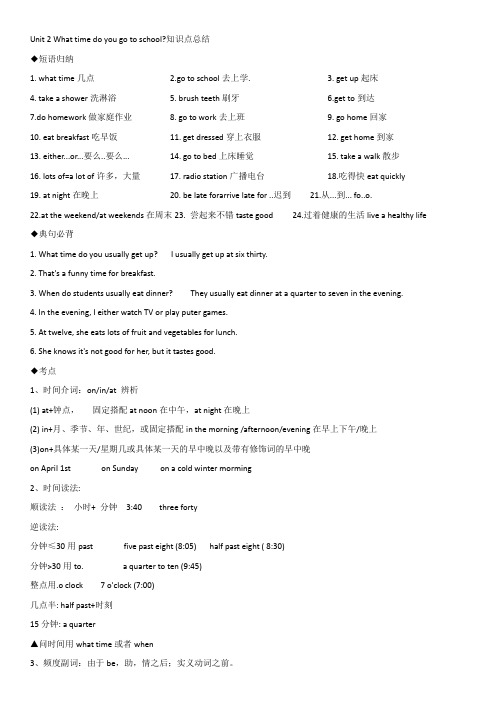
Unit 2 What time do you go to school?知识点总结◆短语归纳1. what time几点2.go to school去上学.3. get up起床4. take a shower洗淋浴5. brush teeth刷牙6.get to到达7.do homework做家庭作业8. go to work去上班9. go home回家10. eat breakfast吃早饭11. get dressed穿上衣服12. get home到家13. either...or...要么..要么... 14. go to bed上床睡觉15. take a walk散步16. lots of=a lot of许多,大量17. radio station广播电台18.吃得快eat quickly 19. at night在晚上20. be late forarrive late for ..迟到21.从...到... fo..o.22.at the weekend/at weekends在周末23. 尝起来不错taste good 24.过着健康的生活live a healthy life◆典句必背1. What time do you usually get up? I usually get up at six thirty.2. That's a funny time for breakfast.3. When do students usually eat dinner? They usually eat dinner at a quarter to seven in the evening.4. In the evening, I either watch TV or play puter games.5. At twelve, she eats lots of fruit and vegetables for lunch.6. She knows it's not good for her, but it tastes good.◆考点1、时间介词:on/in/at 辨析(1) at+钟点,固定搭配at noon在中午,at night在晚上(2) in+月、季节、年、世纪,或固定搭配in the morning /afternoon/evening在早上下午/晚上(3)on+具体某一天/星期几或具体某一天的早中晚以及带有修饰词的早中晚on April 1st on Sunday on a cold winter morming2、时间读法:顺读法:小时+ 分钟3:40 three forty逆读法:分钟≤30用past five past eight (8:05) half past eight ( 8:30)分钟>30用to. a quarter to ten (9:45)整点用.o clock 7 o'clock (7:00)几点半: half past+时刻15分钟: a quarter▲问时间用what time或者when3、频度副词:由于be,助,情之后;实义动词之前。
新人教 英语 七年级下册Unit2 What time do you go to school知识点详解

Unit 2 What time do you go to school?知识点详解单元目标总览:【知识点详解】1、What time do you usually get up,Rick?what time 意为“几点;什么时间”,其引导的特殊疑问句用来询问具体的时间点◆---What time do you get up in the morning?你早上几点起床?---At about 7 o’clock.大约在7点。
拓展:what time与whenwhat time翻译为“几点”问的是具体的时间,一般回答要具体到小时。
What time do you go to school? 你什么时候/几点上学?I go to school at half past seven o’clock. 我七点半去上学。
回答具体到点钟,且注意在几点前边的介词用at。
when也是对时间的提问,但与what time的区别是:用when提问,回答既可以是具体的时间,也可以是不具体的时间,如:in the morning,last year,in 1998等范围大的时间,例如:When does he take a shower?他什么时候洗澡?He takes a shower in the morning. 他在早上洗澡。
也可用具体时间:I take a shower at 6 o’clock in the morning. 我早上六点洗澡。
2、get dressed穿上衣服dress做动词,意为“穿衣服”,其宾语多是人,常用短语:dress sb 给某人穿衣服◆The boy can dress himself.这个男孩可以自己穿衣服。
get dressed穿上衣服,表示动作◆Get up and get dressed.起床穿衣服。
be dressed in 穿着,强调状态◆She is dressed in red clothes.她穿着红色的衣服。
- 1、下载文档前请自行甄别文档内容的完整性,平台不提供额外的编辑、内容补充、找答案等附加服务。
- 2、"仅部分预览"的文档,不可在线预览部分如存在完整性等问题,可反馈申请退款(可完整预览的文档不适用该条件!)。
- 3、如文档侵犯您的权益,请联系客服反馈,我们会尽快为您处理(人工客服工作时间:9:00-18:30)。
5、You can post a letter to your penfriendin a post o________.
6、She is _________(在两者之间) Tom and Jack..
7、The pay p______ isnearthe school.
---I’m going theremy car.
A. inB. byC. on
5. ---Do you like the music of the Moonlight Sonata?
---Yes, itreally beautiful.
A. feelsB. soundsC. listens
6. Miss Ma always helpswithEnglish.
A. an egg and two meatsB. two apples and some milk.
C. three potatoes and many rice .D. four orange juice and a lot of yogurt .
4. ---How are you going to the rain station to meet your aunt?
12. Miss Ma always helpswithEnglish.
A. I, myB. me, myselfC. me, my
13. Whatto you just now?
A. did happenedB. happenedC. happens
14. The foodmy country is quite differentthat inJapan.
"No, sir. He was too busy last night, so I had to do it all myself," said Tim.
Step 1重点词汇和短语
一、朗读下面单词并翻译。
post,office,restaurant,library,supermarket,bank,park,pay,street,center,mail,near,bridge,across,between,front,behind,excuse,straight,turn,left,right,down
2. There were aboutfilms on show during the Film Festival.
A. two hundred ofB. two hundredC. two hundreds
3. --What’s in the fridge?
--Only ______________.
8. Iseasy to finish the project before National Day?
A. itB. thatC. this
9. The car is running. It seems to be flying.
A. more and more fastB. fast and fastC. faster and faster
A. in, fromB. from, toC. to, from
15. . --How do you like this city?
--Very much,But I think people here are the most _____.I’m so _______in their daily life.
10. The teacher told usExercise1 inour exercise books.
A. to doB. doC. doing
11. --can you _______French,Tom?
--Yes,but only a little.
A. sayB. speakC.nterestingB. interesting;interested
C. interested;interestedD. interesting;interesting
Did your dad help you?
One day, Tim's math teacher looked at his homework and saw that he had got all his sums right. The teacher was very pleased-and rather surprised. He called Tim to his desk and said to him, "You got all your homework right this time, Tim. What happened? Did your father help you?"
A. I, myB. me, myselfC. me, my
7. ---Here is the paper for you!
---Oh, thanks. It’sfor me to write a long letter on.
A. big enoughB. enough largeC. small enough
卓越个性化教案GFJW0901
学生姓名年级初二授课时间2011.08.05.教师姓名课时2
教学目标
复习七年级下Unit2的重点知识和语法点
重点难点
1. ---What would you like, Madam?
---I’d like, please.
A. two bottles of orangeB. two bottle of orangesC. two bottle of oranges
二、在括号里填上适当的单词。
1、The _________(餐馆)isnext tothe school.
2、There are a lot of books in the l___________.
3、If(如果)you have much money, you can put it in a b________
